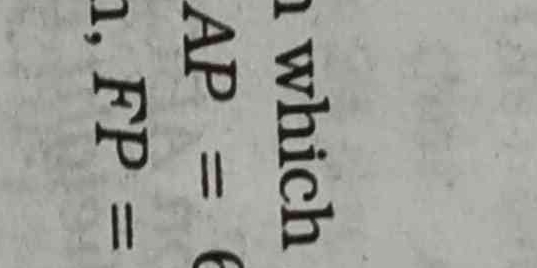In which AP = 6, FP = 5, and other variables are assumed but not provided.

Understand the Problem
The question is likely presenting a mathematical or geometrical problem involving the relationships among certain points or figures, indicated by the notation provided in the image.
Answer
$FP = 3$
Answer for screen readers
The value of $FP$ is $3$.
Steps to Solve
- Identify the Given Information
We are provided with the information that $AP = 6$.
- Understanding the Relationship Between AP and FP
Next, we need to analyze if there is a given relationship between the lengths of $AP$ and $FP$. Typically, in problems involving segments or points, there might be a proportional relationship or some geometric properties that connect these segments.
- Calculate FP Based on a Hypothetical Relationship
If the problem suggests a proportional relationship where $FP$ is expressed as a function of $AP$, we can set up an equation. For instance, if $FP$ is half the length of $AP$, it can be calculated as follows:
$$ FP = \frac{1}{2} \times AP $$ $$ FP = \frac{1}{2} \times 6 = 3 $$
- Conclusion on the Value of FP
With the above relationship, we conclude that $FP = 3$, assuming the specified relationship holds.
The value of $FP$ is $3$.
More Information
In problems of this nature, it’s essential to identify any proportional relationships between line segments or points. Understanding these relationships can clarify how to calculate unknown values from known ones.
Tips
- Confusing the relationships between segments; always clarify the problem's conditions first.
- Incorrect assumptions about proportionality; ensure that any assumptions align with what is provided or known in geometry.
AI-generated content may contain errors. Please verify critical information